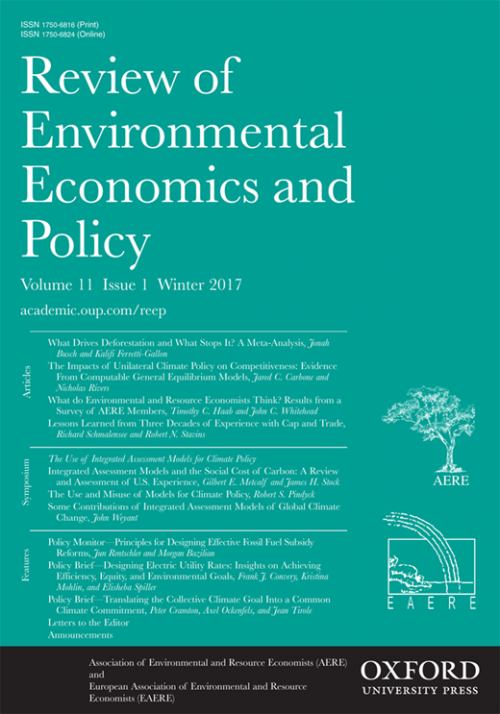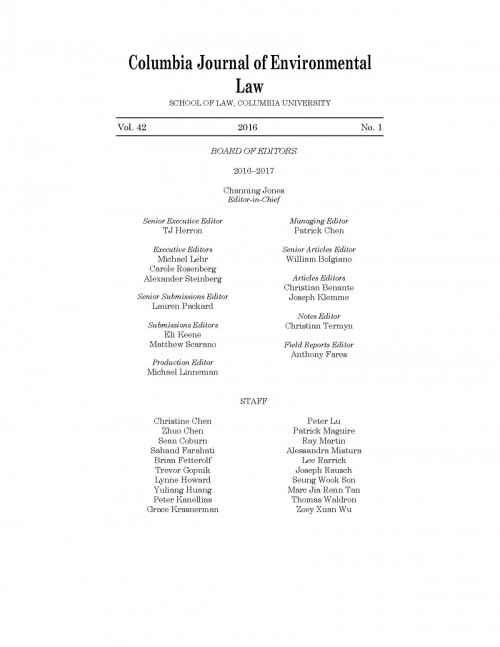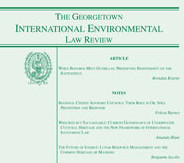-

The Social Cost of Carbon: A Global Imperative
To solve the unprecedented global commons problem posed by climate change, all nations must internalize the global externalities of their emissions. If not, collective efforts will never achieve an efficient, stable climate outcome. The United States’ practice of looking at the global impact of emissions has come under attack in courtrooms and academic journals, with some arguing that the U.S. should instead consider only the domestic impacts of climate change in its decisionmaking.
In a letter published in Review of Environmental Economics and Policy, we argue that federal agencies should continue to use a global number for Social Cost of Carbon, as developed by the Interagency Working Group on Social Cost of Carbon. First, the United States benefits tremendously if other countries set policy based on global rather than local effects. From a legal perspective, not only does international law—the U.N. Framework Convention on Climate Change—commit the United States to account for global effects, but domestic laws like the Clean Air Act and the National Environmental Policy Act also either require or give discretion to agencies to consider global climate costs. Many seemingly “foreign” climate damages would actually spill over to harm the United States.
-
Détente from the Air
Monitoring Air Pollution during the Cold War
During the period of détente in the 1970s, a Norwegian proposal to construct an air pollution monitoring network for the European continent resulted in the first concrete collaboration between the communist and capitalist blocs after the 1975 Helsinki Accords. Known as the “European-wide monitoring programme” or EMEP, the network earned considerable praise from diplomats for facilitating cooperation across the Iron Curtain. Yet as this article argues, EMEP was strongly influenced by the politics of détente and the constraints of the Cold War even as it helped to decrease tensions. Concerns about national security and sharing data with the enemy shaped both the construction of the monitoring network and the modeling of pollution transport. The article proposes that environmental monitoring systems like EMEP reveal the ways in which observational technologies can affect conceptions of the natural world and the role of science in public policy.
-

Think Global
International Reciprocity as Justification for a Global Social Cost of Carbon
U.S. climate regulations present a special case of federal agencies applying a global, rather than exclusively domestic, perspective to the costs and benefits in their regulatory impact analyses. Since 2010, federal agencies have emphasized global valuations of climate damages for policies that affect carbon dioxide emissions, using a metric called the “Social Cost of Carbon.” More recently, agencies have also begun to use a global valuation of the “Social Cost of Methane,” for methane emissions. Yet lately, these global metrics have come under attack in courtrooms and academic journals, where opponents have challenged the statutory authority and economic justification for global values. This paper defends a continued focus on the global effects of U.S. climate policy, drawing on legal, strategic, and economic arguments.
-

Next Steps to Reform the Regulations Governing Offshore Oil and Gas Planning and Leasing
Published in the Alaska Law Review
In this article, we argue that fundamental reform is necessary and highlight a series of key themes and topics that must be addressed to improve the regulatory process and promote better, more consistent management outcomes. While the article draws on examples from frontier areas-in particular the U.S. Arctic Ocean-the recommended changes would apply to and benefit all areas of the OCS.
-

Legal Pathways to Reducing Greenhouse Gas Emissions Under Section 115 of the Clean Air Act
The most efficient legal tool for addressing U.S. climate pollution can likely be found in an unused provision of the Clean Air Act. Section 115 of the Act, titled “International Air Pollution,” authorizes the EPA to develop and implement an economy-wide, market-based program to reduce domestic greenhouse gas emissions. This article, jointly authored by a team of law professors and attorneys at three of the country’s leading institutes focused on climate change and environmental law, offers an in-depth analysis of Section 115, which would provide the most flexible approach for achieving the targets from the Paris climate agreement.
Viewing all publications in Academic Articles/Working Papers
